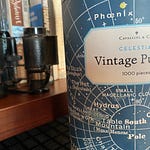In a 2017 blog post, J.L. Bell records this conversation between Benjamin Franklin and Elizabeth Powel, wife of the mayor of Philadelphia:
Powel: Well, Doctor, what have we got?
Franklin: A republic, Madam, if you can keep it.
Powel: And why not keep it?
Franklin: Because the people, on tasting the dish, are always disposed to eat more of it than does them good.
Happy Presidents’ Day. Ann Calandro’s story “The Wanderer Fantasy” gives us shivers every time we read it, or hear it read. Do you think the ending is a happy one?
My dear friend,
These past years have been so very difficult, but today is moving day. After the Great Pandemic and subsequent elections, there were many calls for unity from politicians and others, but it did not seem that everyone wanted unity. Things continued as they had been, with finger-pointing and harsh words, government gridlock, supply chain shortages, and outbursts of misinformation.
At the same time, people continued to do what needed to be done: wearing masks, renewing driver’s licenses and passports, going to school and work, scheduling repairs for cars and appliances, gardening, shopping, and following or avoiding the news. Vaccines became available, and the virus became yet another condition to be avoided or managed. The country became more polarized until everything became a battleground. Then the envelopes arrived.
Each contained a survey and a postage-paid return envelope. Everyone was required to complete the survey within five days and mail it back. The survey wasn’t long, and its purpose was straightforward: “Choose the country in which you want to live by answering the following questions.” The country would be turned into two countries based on the survey results, and people would be taken to and resettled in one country or the other. Details on what could be carried, what would be moved for us, and what would stay would be provided later, we were told, but for now, we merely needed to fill out and return the survey. Questions included: What was important to us? Was it universal health care, or being able to make as much money as possible? Was it a lower salary and a social safety net, or a higher salary and lower taxes? Was it a smaller home and a pension someday, or a bigger home and a 401(K) and stock options now?
How do you plant flowers? How do you shop? What are the contents of your refrigerator and cupboards? If someone said or did X, would you do Y or Z? The questions went on and on.
If people did not complete the survey, they were reminded, then fined, and finally imprisoned.
Months passed, during which additional letters arrived, with more information and instructions on what people could bring with them and where each person or family would live in their new location. Based on my answers to the survey, I was not surprised when I received my assignment to one of the two countries. I began the slow process of choosing what I could take with me and what I wanted sent later. Not for the first time I wished that I had chosen, or been chosen by, an instrument other than a grand piano, since I could not bring it with me. Still, even a cello would be hard to maneuver now, at my age. I hoped there would be a piano somewhere near my new home. If not, I would learn a new instrument or turn to another form of art.
Then, several weeks before everyone was scheduled to criss-cross the country in a web of buses and trains, with their papers and two suitcases and one backpack, I learned from a fellow artist that many of the surveys had been incorrectly tallied and processed, so that once everyone was resettled, there would be two battleground countries, not just one, and the entire relocation plan would be for naught. “There’s a third option,” I was told. “It’s a country for artists. Would you like to settle there?” “Yes,” I said. How could I refuse? Hadn’t I spent my entire life looking for people like me?
And so I received my secret, separate set of instructions on where to go and what to say. As soon as I finish writing this letter, I will head out to the meeting point. To one of my suitcases I will add some sheet music. After much thought about what piano music to take, usually in the middle of the night when I cannot sleep and roam the hills and valleys of memory, I chose, from a mix of composers, a prelude, a romance, a rhapsody, an intermezzo, a nocturne, an elegy, and a fantasy—the Wanderer Fantasy. It’s not my favorite fantasy, but its name makes it an appropriate one. Aren’t we all wanderers in a fantasy, looking for a place to call home?
I will leave this letter in the piano bench, on top of the rest of my music, for you to find, whoever you may be and whenever you arrive. I hope you, or someone you love, will be comforted by it.
Until that day, take care, and be well. Good-bye.
















Share this post